What if an Adoptive Parent Could Understand What Being Adopted is Like for a Mere Infant?
In advance of National Adoption Awareness Month, which starts soon, I offer you insight into a different type of awareness than you might be used to when it comes to November.
The guest post below is from Julian Washio-Collette, whom I have come to know from his writing with Adoptee Voices and through his participation as a panelist in an adoption book discussion about the young adult novel The Giver.
His essay below challenges the assumption of a baby as a blank slate, as well as the notion that nothing that happens to a baby early on — before they might be able to form words around it — matters or even registers. Accepting that line of thinking is the only way we could have set up such dysfunctional 20th century | adoption practices, in which the adoptees themselves were the least considered party, which caused harm to them and, sadly, to those who love them.
After all, (I say with my tongue in my cheek), they were just babies.
Julian helps those who are willing to see — see otherwise. His words are for those who strive to see and who have the capacity to hear, which are two traits that adoptees need their parents to have.
See if you can read this essay with curiosity and openness for not only what Julian aims to reveal to us, but also for yourself and what you experience in response to his words.
I Am Already Charged
Some say I won’t remember, that I am a mere infant, resilient, and will easily adjust. But every cell in my body is acutely sensitive, unshielded, absorbing every impression, every sensation, and imprinting them upon my nervous system. The impact of this first separation will lay the foundation for how I will perceive and respond to everything that is to come. My body will remember more thoroughly and accurately than my mind can recall. My body cannot forget.

Some say I am a blank slate, that biology is not so essential to identity and belonging. But I am already charged with the dreams of my ancestors, communicated to me through my mother’s blood, bone, voice, inflections, moods, and the rhythms of her sleeping and waking, movement and stillness. I emerge from her womb, and I know. My senses reach for her like tuning forks seeking a common vibration. My whole body aches for the living field of energy that has enclosed me since my conception. I am born full of my own being, still inseparable from my mother.
And yet, flung abruptly into the bright chaos of this world, my senses cannot find the eyes, the touch, sounds, smells and tastes that mirror and affirm my being. The dance of shared rhythms that held me only drifts further and further away, fading to a mere distant echo of the only life, the only world, I knew.
Can You Give Me What I Need?
This is when I am introduced to you—to new sounds, smells, tastes, and touches, new sights that overwhelm and disorient me, eyes that mirror an unfamiliar reflection. The dreams of ancestors who are not my own begin to seep into my dreams, disrupting my body’s knowledge of who I am and where I come from. I lie in your arms and return your gaze across an abyss of unfathomable loss, longing for home.
Understand that not all of me can cross this abyss to meet you, that there will always be a part of me left behind, inaccessible to you. Here, love is not enough. What I need is for you to convey to me, deeper than words, that you acknowledge this rupture that I endured, that you will help me to carry it through life, that you will carry it with me. What I most need to hear from you, through the unfiltered immediacy of body speaking to body, is not that you want me, or that you chose me, or that you love me, but first, without excluding these other expressions of care, communicate tenderly to my heart: “I am sorry for your loss. I will not forget where you come from. I will remember with you.” Only then can we truly begin this journey together. Only then can I become real.
About Julian Washio-Collette
Julian Washio-Collette is a domestic double-adoptee, relinquished and adopted as an infant and again at age 9. He currently resides in Portland, Oregon, where he is a member of an intentional community that serves the needs of the unhoused and socially and economically marginalized. He blogs occasionally about healing, spirituality, and the impacts of his two adoptions at Peregrine Adoptee.
More Adoptees’ Viewpoints
- The Green Binder by Cynthia Landesberg
- Roberta Holland’s Happy Birthday
- Don’t You Know We Love You? by Lorah Gerald
- Why Linda Pevac Needed an Alter Ego & How She Finally Merged Herselves
Lori Holden, mom of a young adult daughter and a young adult son, writes from Denver. She was honored as an Angel in Adoption® by the Congressional Coalition on Adoption Institute.
Her first book, The Open-Hearted Way to Open Adoption: Helping Your Child Grow Up Whole, makes a thoughtful anytime gift for the adoptive families in your life. Her second book, Standing Room Only: How to Be THAT Yoga Teacher is now available in paperback, and her third book, Adoption Unfiltered, is now available through your favorite bookseller!
Find Lori’s books on her Amazon Author page and catch episodes of Adoption: The Long View wherever you get your podcasts.


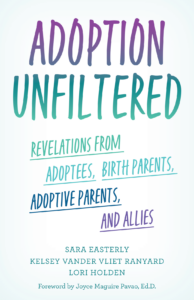
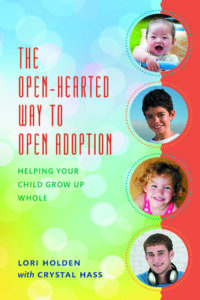
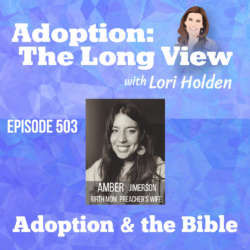
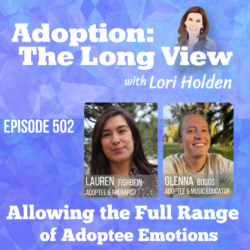
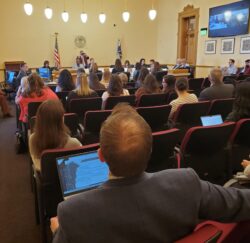
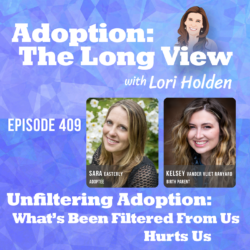

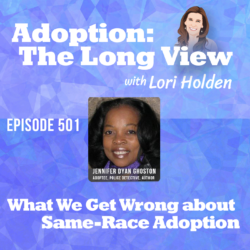
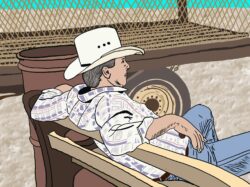
2 Responses
I dispute the essay label – that is definitely a poem!
I was just reading an article about foster parenting shenanigans in Colorado the other day, and thinking about how there’s all this evidence that shows that babies know their mom’s voice, and probably smell. And if the dad was present, the baby knows him too. Blank slate is so contradicted by actual research, I can’t believe anyone still clings to it.
These are not the first words I’ve related to written by Julian Washio-Collette. The resilience required of an adoptee’s nervous system being shaped and formed around the chaos endured is hauntingly beautiful. And putting language to the indescribable is both harmonious and healing.